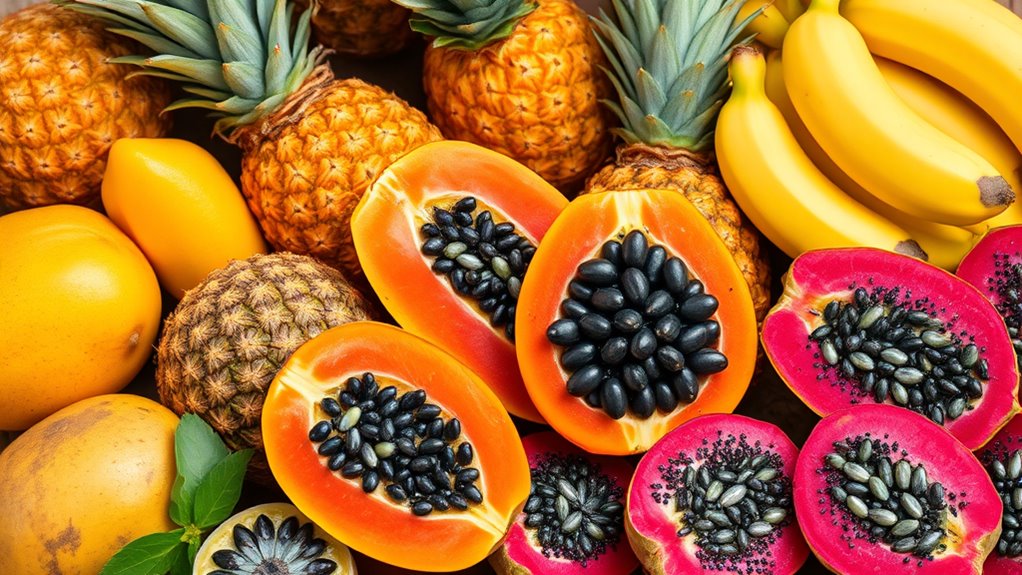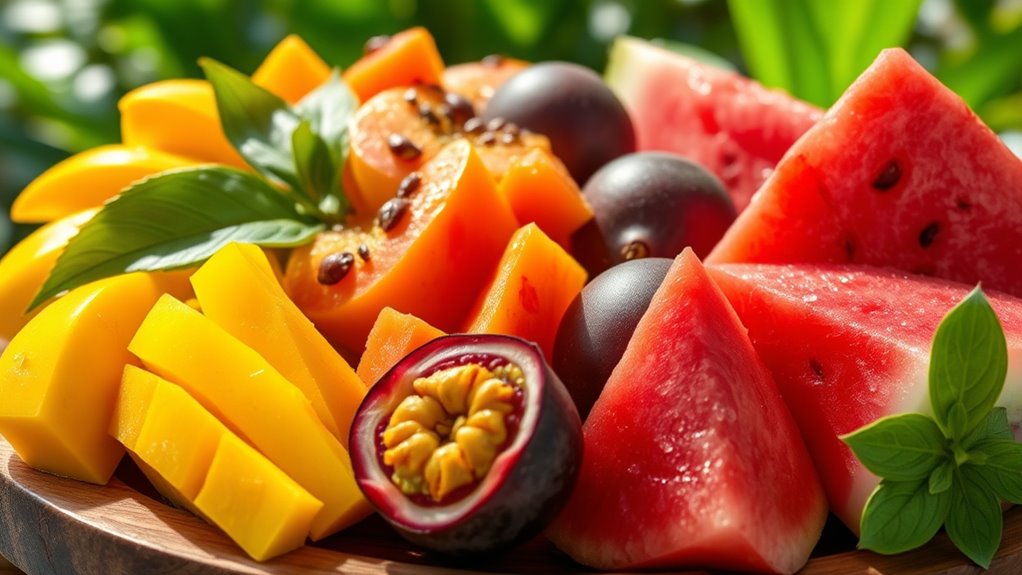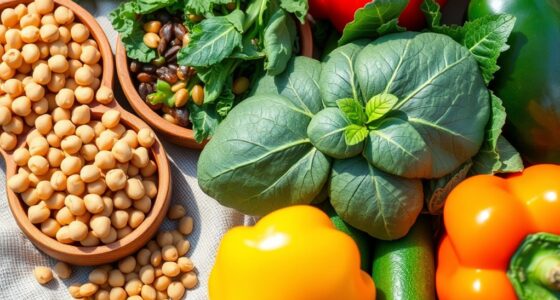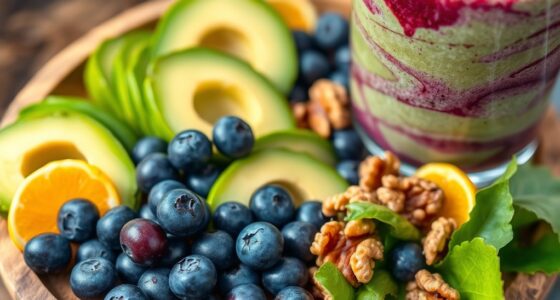Tropical fruits are packed with nutrients that boost your health, offering antioxidants to fight free radicals and reduce oxidative stress. They’re rich in vitamins like C, A, and B, which support your immune system and skin. Their high fiber content improves digestion and helps control blood sugar. Plus, many fruits like watermelon and mango keep you hydrated and energized. Keep exploring to discover how incorporating these vibrant fruits can enhance your overall wellness.
Key Takeaways
- Tropical fruits are rich in antioxidants that combat free radicals and reduce oxidative stress, supporting overall health.
- They contain high levels of vitamins like C, A, and B, boosting immune function and skin health.
- The fiber content in tropical fruits promotes digestion, regulates blood sugar, and aids weight management.
- Many tropical fruits have high water content, aiding hydration and providing essential nutrients like potassium and enzymes.
- Their versatility allows easy inclusion in diets, maximizing nutrient intake and supporting overall wellness.

Tropical fruits are packed with essential nutrients that can boost your health in numerous ways. When you include these vibrant, flavorful options in your diet, you’re giving your body a powerful dose of tropical fruit antioxidants. These compounds help neutralize free radicals, reducing oxidative stress and lowering your risk of chronic diseases like heart disease and certain cancers. Whether you’re enjoying a sweet mango or a tangy pineapple, you’re also benefiting from exotic fruit vitamins that support your immune system, improve your skin, and boost your energy levels. These vitamins, such as vitamin C, B vitamins, and vitamin A, are often found in high concentrations in tropical fruits, making them a delicious and effective way to meet your daily nutritional needs.
Tropical fruits are rich in antioxidants and vitamins that boost immunity and fight chronic diseases.
As you indulge in tropical fruits, you’re also taking advantage of their high fiber content, which supports digestion and helps maintain healthy blood sugar levels. Fiber promotes a feeling of fullness, so eating a handful of tropical fruit can curb hunger and prevent overeating. The natural sugars present in these fruits are a healthier alternative to processed snacks, providing you with quick energy without the crash associated with refined sugar. Plus, many tropical fruits are rich in water content, helping you stay hydrated, especially in hot weather or after physical activity.
You’ll find that the diverse array of tropical fruits offers a spectrum of health benefits. For instance, bananas are loaded with potassium, which helps regulate blood pressure and supports muscle function. Papayas contain an enzyme called papain that aids digestion and reduces inflammation. Guavas are among the best sources of vitamin C, strengthening your immune response and improving skin health. Passion fruits offer a unique mix of antioxidants and vitamins that promote mental clarity and boost your overall vitality. Incorporating these fruits into your diet can also provide additional nutritional advantages that support overall wellness.
Incorporating these fruits into your diet is simple and versatile. You can add sliced mango to yogurt, blend pineapple into smoothies, or enjoy a fresh fruit salad with kiwi and papaya. Not only do they taste great, but they also enhance your overall well-being. The key is variety—by consuming a colorful mix of tropical fruits, you ensure you’re getting a broad spectrum of exotic fruit vitamins and antioxidants that work synergistically to keep you healthy. So, next time you’re at the grocery store or farmers’ market, reach for these nutrient-dense tropical options and give your body the nourishment it deserves.
Frequently Asked Questions
Which Tropical Fruit Has the Highest Vitamin C Content?
You’ll find that guava has the highest vitamin C content among tropical fruits. As a top Vitamin C source, it surpasses oranges and other citrus fruits in tropical fruit nutrition. Eating guava boosts your immune system, promotes healthy skin, and fights free radicals. Incorporate it into your diet for a delicious, nutrient-packed choice that maximizes vitamin C benefits, making it an excellent tropical fruit for overall health.
Are Tropical Fruits Suitable for People With Allergies?
Tropical fruits can be a delightful addition to your diet, but they might not be suitable for everyone. You should consider allergy considerations, as some fruits can trigger reactions. Be aware of cross reactivity risks, especially if you’re allergic to birch pollen or latex. Always introduce new tropical fruits gradually and consult with an allergist if you have known sensitivities. Your health and safety come first!
How Do Tropical Fruits Compare to Berries in Antioxidants?
Tropical fruits generally have higher antioxidant levels compared to berries, making them excellent for fighting free radicals. While berries like blueberries and strawberries are rich in antioxidants, tropical options like mangoes and papayas pack a punch too. When doing a fruit comparison, you’ll find tropical fruits often offer a broader range of antioxidants, boosting your immune system and overall health. So, mix both for maximum benefits!
Can Tropical Fruits Help Improve Digestion?
Yes, tropical fruits can help improve digestion by boosting your gut health. They’re rich in fiber, which aids in fiber digestion and promotes regular bowel movements. Incorporating fruits like papaya, pineapple, and mango into your diet provides enzymes and nutrients that support healthy digestion. These fruits help maintain a balanced gut, reduce bloating, and improve overall gastrointestinal function, making them a tasty way to enhance your digestive health.
What Is the Best Way to Store Tropical Fruits to Maximize Freshness?
Think of storing tropical fruits as a delicate dance, where timing and technique lead to freshness. To keep them ripe and juicy, use proper ripening techniques and place them in breathable storage containers or paper bags. Keep most tropical fruits in the fridge’s crisper drawer, but let bananas and mangoes ripen at room temperature first. Proper storage turns your tropical treasures into a daily burst of sunshine.
Conclusion
As you embrace the vibrant flavors of tropical fruits, remember they’re like treasures waiting to be uncovered. Just like a traveler discovering hidden gems, you’ll find that each bite offers a burst of nutrients that boost your health. For example, eating a mango can provide over 20% of your daily vitamin C needs. So, make these fruits part of your daily routine, and watch your well-being flourish, turning every meal into a nourishing adventure.









